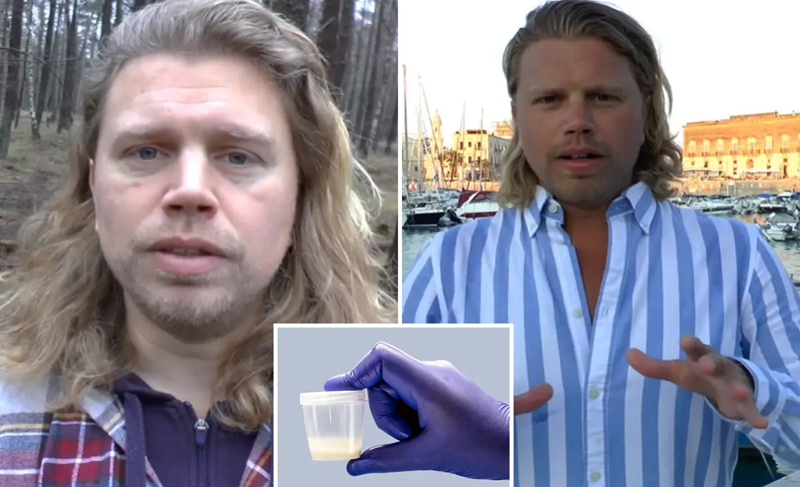Sperm Donor Claims Netflix Series Misrepresents His Story
A sperm donor has come forward claiming that a Netflix series has misrepresented his story. The donor, who remains anonymous, alleges that the show inaccurately portrays his motivations for donating sperm and the impact it has had on his life. He argues that the series fails to capture the complexities of his decision to donate and the emotional toll it took on him. The donor also claims that the show sensationalizes his experience in order to create drama for entertainment purposes. He believes that his story has been distorted and manipulated to fit a narrative that is not true to his own lived reality. The donor is seeking to set the record straight and ensure that his side of the story is accurately represented.

Allegations of Misrepresentation
Allegations of misrepresentation can have serious consequences for individuals and organizations alike. When someone is accused of misrepresenting information, it can damage their reputation and credibility in the eyes of others. In business, misrepresentation can lead to lost trust from customers and partners, as well as potential legal disputes. It is important for individuals and organizations to be transparent and honest in their communications to avoid any misunderstandings or accusations of misrepresentation.
However, sometimes misrepresentation can occur unintentionally, due to misunderstandings or miscommunication. In these cases, it is important to address the issue promptly and take steps to rectify any inaccuracies. Additionally, allegations of misrepresentation can also arise in the political realm, where politicians may be accused of distorting facts or making false promises in order to gain support.
This can have far-reaching consequences, impacting public trust in the political system and leading to increased skepticism and cynicism among the electorate. Overall, allegations of misrepresentation highlight the importance of honesty and integrity in all forms of communication, and the need for individuals and organizations to be vigilant in ensuring that they are accurately representing themselves and their actions.
Details of the Dispute
The details of the dispute between the two parties are complex and multifaceted. At the heart of the matter is a disagreement over the terms of a business contract, with both sides claiming that the other has failed to uphold their end of the agreement. The dispute arose when one party accused the other of breaching the contract by not delivering the promised goods on time. In response, the other party argued that they were not able to meet the deadline due to unforeseen circumstances beyond their control. As tensions escalated, both parties became entrenched in their positions, refusing to compromise or find a mutually agreeable solution.
The dispute quickly spiraled out of control, with accusations and counter-accusations flying back and forth. Attempts at mediation and arbitration were unsuccessful, as neither party was willing to budge from their stance. The dispute has since escalated to the point where legal action may be necessary to resolve the issue. The details of the dispute are murky and complicated, with both parties presenting their own version of events and evidence to support their claims. It remains to be seen how the dispute will ultimately be resolved and what impact it will have on the relationship between the two parties.

Series Production and Response
Series production and response are two important components of any successful operation. Series production refers to the process of creating multiple products or services in a systematic and efficient manner. This allows businesses to streamline their operations, reduce costs, and increase overall productivity. In contrast, response involves how a company reacts to various challenges and changes in the market. This could include adjusting production levels, responding to customer feedback, or adapting to external factors such as economic trends or technological advancements. Both series production and response are crucial for businesses to stay competitive and meet the demands of their customers.
Effective series production requires careful planning, organization, and coordination of resources. Companies must have a clear understanding of their production capabilities, market demand, and supply chain logistics to ensure a smooth and efficient process. By implementing best practices such as lean manufacturing principles, just-in-time inventory management, and automated production systems, businesses can optimize their series production and maximize efficiency.
On the other hand, response involves the ability of a company to adapt and react quickly to changing circumstances. This could involve adjusting production schedules, launching new products or services, or implementing marketing strategies to address shifts in consumer preferences. Companies that are able to respond effectively to market changes are more likely to succeed and thrive in today’s fast-paced business environment.
In conclusion, series production and response are essential components of any successful business operation. By optimizing production processes and being responsive to market changes, companies can stay ahead of the competition and meet the needs of their customers. It is important for businesses to continuously evaluate and improve their series production and response strategies in order to remain competitive and achieve long-term success.

The Donor’s Perspective
From the donor’s perspective, the act of giving can be a deeply personal and fulfilling experience. For many, the decision to donate is driven by a sense of compassion and empathy towards those in need. It is a way to make a meaningful impact and contribute to the well-being of others. In some cases, donors may have a personal connection to the cause they are supporting, perhaps having been directly affected by the issue themselves or knowing someone who has.
For others, the act of giving may be a way to express gratitude for the blessings they have received in their own lives. Additionally, donating can also be a way to leave a lasting legacy and make a difference in the world beyond one’s own lifetime. Ultimately, the act of giving is a way for donors to express their values and beliefs, and to show solidarity with those who are less fortunate. It is a way to foster a sense of community and interconnectedness, and to create a more compassionate and caring society.
